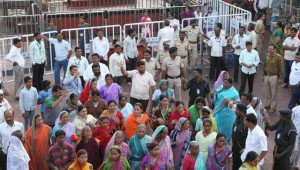Uttarakhand Dalits demand entry into temples, spark fears of conflict
 Dehradun: Dalits in Uttarakhand are preparing to fight a centuries-old tradition that forbids them from entering and worshipping at 349 temples of the hill state’s Jaunsar-Bhabar region, which might ignite a volatile face-off with upper-caste communities.
Dehradun: Dalits in Uttarakhand are preparing to fight a centuries-old tradition that forbids them from entering and worshipping at 349 temples of the hill state’s Jaunsar-Bhabar region, which might ignite a volatile face-off with upper-caste communities.
Dubbed the holiest land for Hindus, the Himalayan state is studded with thousands of temples, many of which have been off-limits for low-caste people.
Dalit leaders said they would forcibly enter the temples, especially five popular ones in the Jaunsar-Bhabar region of Dehradun district, constituting the Chakrata hill block.
The campaign will begin at Sindhugur Maharaj temple at Pokhari village of Chakrata on May 20, where a religious function to mark its Rs 2.5-crore renovation is expected to attract about 10,000 people, they said. The shrine, like many others in the area, is reserved for upper castes.
“The temple committee engaged Dalit labourer for the renovation. It sought donation from members of the community but won’t allow them to worship in the temple now. It plans to drive away Dalits visiting the temple on May 20,” said Daulat Kunwar, who will lead a march along with BJP leader Tarun Vijay.
He said such discrimination and subjugation won’t be tolerated. “We will enter the temple, come what may.”
The Dalits plan on entering the Khatwa Dev and Regyo temples, both in Chakrata, and the Bisoi shrine in Kalsi.
“Similar efforts were made at Kukurshi Maharaj temple at Gabela village but the temple committee washed the floor with Ganga water later, saying it was desecrated by Dalits,” Kunwar said on Tuesday.
Caste-based temple controversies are nothing new. Former Prime Minister Indira Gandhi was stopped at the gates of the Jagannath temple in Puri as she was deemed an outcast for marrying a non-Hindu.
In 2014, a temple in Bihar’s Madhubani district was “purified” — the shrine cleaned and its idols washed — after a visit by then chief minister Jitan Ram Manjhi, a member of the Musahar community.
Caste-centric discrimination, or untouchability, was banned in India in 1955, but centuries-old feudal attitudes persist in many parts of the country and Dalits, who represent 16% of the country’s population, still face prejudice in every sector.
They are sometimes beaten or killed for using a well or worshipping at a temple. The fear of a backlash was palpable among the poor Dalits in Jaunsar-Bhabar region too.
“We want to worship at the temple where we worked as labourers and donated money. But cannot say if it’s going to happen,” said Kripal, a Dalit resident.
Source: The Hindustan Time





